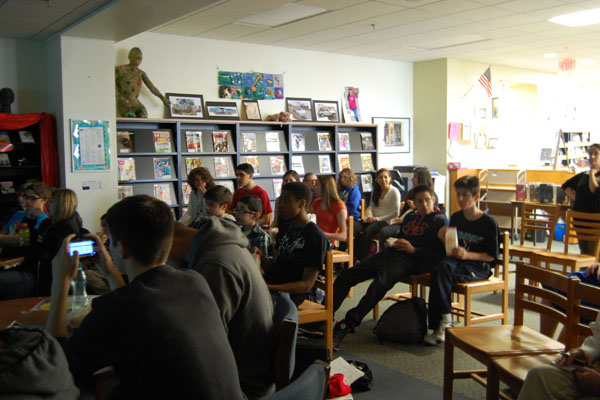For What It’s Worth: Public libraries worth the cost
April 25, 2014
This past week was National Library Week in the RB library. A splendid time was guaranteed for all, or so I gathered. But the economics side of me couldn’t help but think about how the system of having a library works. I am aware that there has been some discussion in the community about the value of public libraries and of spending taxpayer money to improve and maintain them
Well here is how I see the situation
Public libraries are, as the name suggests, public utilities. This means that anyone can enjoy them, and get benefits, without necessarily having to pay for the service, because there is no good way to charge for this service. Other public utilities are things like parks or local roads. But these things have to be paid for somehow, so that’s where tax money comes in
Yes, people don’t have a choice to pay those taxes, but they do have the opportunity to take advantage of everything the library has to offer
Okay, that was kind of boring. That’s the AP example intro. There’s more interesting thoughts down below, just wait
Libraries are not economically profitable. You get to borrow books and movies and magazines and CD’s essentially for free, unless you’re really bad at dates and end up having to pay oodles of money in fines. Even that is occasionally waived, and the librarians don’t usually send fine collectors with axes after anyone who doesn’t pay
If you look at a library ledger it is not going to say “we made $5,000 this month alone!” And some people find fault with paying taxes to fund such an “unprofitable” organization. Or, instead of renovations and continuity, they think a library should reduce itself into a storage space for computers and ebooks, and do away with tangible items altogether
Like people so often do, though, they are only looking at a very limited ledger.
Libraries are places of inspiration and learning. Yes, that sounds cliché. It’s also true
Libraries give people the chance to experiment and take chances with their reading, knowing that they haven’t paid anything, and so will have lost very little if they don’t like the book. This also makes them more environmentally friendly: books are being reused as opposed to bought new twenty-seven times. If you read a book and you like it, by all means buy your own copy. But checking it out first is very low stakes.
Libraries are also places to introduce kids to learning, and to a plethora of books that there is no way they could have stocked in their house. The options are near endless, and who knows which stories could end up changing a kid’s life? A book about viruses might unknowingly lead someone to developing a new vaccine twenty-five years down the line. A fantasy book about dragons could inspire a budding writer to start her own story. A boy learns from a story the kind of character he does not want to grow up to be.
The possibilities are endless, and they cannot be measured.
The people that books develop could be any number of scientists, artists, or just upstanding citizens. Their accomplishments will contribute to the world someday.
They are hidden benefits from libraries that can’t be measured in a month-by-month ledger.
And even if you, personally, don’t care for libraries (I’m sorry, I’m so sorry), what right have you to deny children the chance to learn, all ages the chance to explore, and the future the knowledge that they will gain?
I could go on, but the cost of reading this article might become too high for some of you. I’ll finish by saying that no, libraries aren’t necessarily perfect. They might lend you scratched DVD’s, for instance.
However the intrinsic, implicit benefits are always going to outweigh the costs.



